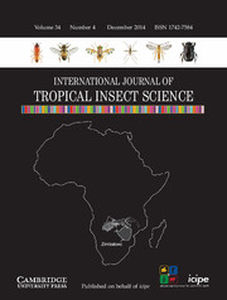No CrossRef data available.
Article contents
Effects of potassium chloride and potassium sulphate on the efficacy of insecticides against infestation by Helopeltis theivora (Heteroptera: Miridae) in tea plantations
Published online by Cambridge University Press: 15 August 2014
Abstract
Helopeltis theivora Waterhouse is a major sucking pest of tea in northeast India. No effective predators or parasitoids have been recorded from the field, and, therefore, insecticides play a significant role in the control of this pest. Potassium is known to impart physiological resistance to plants against sucking pests. The present study conducted two field trials to evaluate the bioefficacy of thiamethoxam 25 WG and bifenthrin 8 SC applied alone at the dosage recommended by the Tocklai Tea Research Institute and in combination with 2% potassium chloride (KCl) and mined potassium sulphate (K2SO4) against H. theivora. No phytotoxic effects were observed in the field when tea bushes were sprayed. The control of H. theivora achieved by the combinations of thiamethoxam+KCl/K2SO4 and bifenthrin+KCl/K2SO4 was found to be statistically significant (P< 0.05) compared with the sole application of the insecticides. These treatments could be included in the current integrated pest management programme against H. theivora.
- Type
- Short Communication
- Information
- International Journal of Tropical Insect Science , Volume 34 , Issue 3 , September 2014 , pp. 217 - 221
- Copyright
- Copyright © ICIPE 2014


